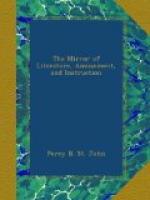About twenty-three years ago, the vane of Strasbourg Cathedral was struck by lightning, so that it hung on one side, threatening by its fall to endanger the lives of the people below. The alarm was so great, that the authorities, after a special consultation, posted bills about the streets, offering any reward that should be required to any one that would venture to ascend and strike off the vane. While the good citizens were reading this announcement, a peasant from the department of the Landes passed by, and being unable to read, he inquired the purport of the advertisement. When informed, he immediately offered his services for that purpose, and was conducted to the mayor and the bishop, who happened to be both in the Hotel de Ville at the time. They questioned him, and fully acquainted him with the difficulties of the enterprise—such as the real height, and that the upper part of the spire could only be ascended by ladders on the outside. However, nothing daunted, he persisted in his resolution to perform the feat on the morrow. All Strasbourg was assembled in the open places of the city on the next day; and, although admiring his courage as they saw him ascend, they most prudently refrained from cheering him as he deserved. Few who were then shading their eyes from the sun, in order to gaze on the spire, but must have envied him the scene of surpassing loveliness that was spread below him, although it is probable that neither the green landscape fading into blue distance, the relics of ancient castles, nor the beautiful Rhine glittering in sunshine, detained his regards. He who at home, in his own barren and level sands, had been used to no greater elevations than his stilts, was now mounting like an eagle towards heaven, and admired by thousands. When he reached the summit, he deliberately seated himself on the highest stone, with one leg on each side of the vane; and while his clothes were visibly fluttered in a strong breeze at such an eminence, he, with a hammer and chisel, displaced the cross that had caused such alarm, It flew spinning to the earth, and, borne away by the wind, fell in a neighbouring field, where it sank twenty inches into the soil. The air was now rent with acclamations towards him,
Cui robur et aes triplex
Circa pectus erat—
(for, be it remarked, he was the only person who had even proposed to effect its removal). On his descent, he was carried in triumph to the Hotel de Ville. Being thanked by the authorities then and there assembled, and assured of their intense anxiety for his life ever since he had quitted the earth, he was asked what was the recompense he demanded? He modestly replied, “that if they were pleased with what he had performed, he hoped they would not think him presumptuous, but he should so much like to walk through the Arsenal, and see all its wonderful stores and docks!”—and they could not prevail upon him to ask more.
A week afterwards he left Strasbourg, with twenty-five Napoleons in his pocket; and declared that he had never before spent his time so agreeably as he did in that city, for he had seen the Imperial Arsenal, the fortifications, and many other fine, as well as useful, sights, and had been continually feasted gratis by the rich and the great folks.




